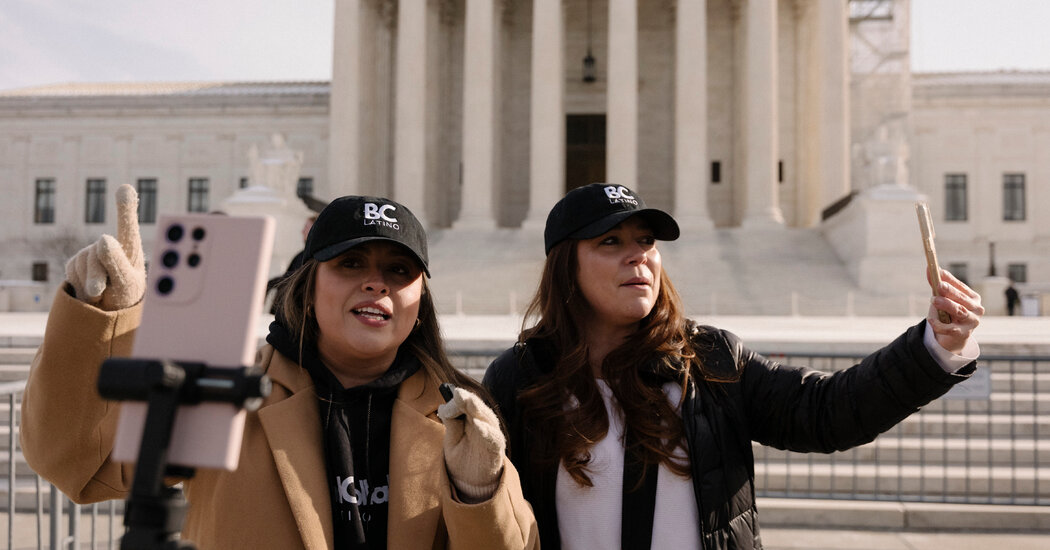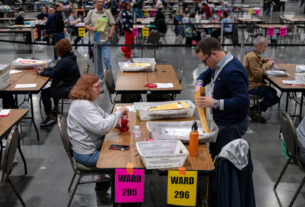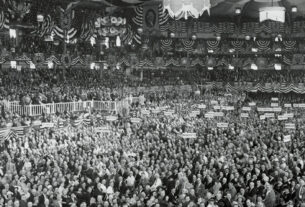The Supreme Court ruled against TikTok on Friday, rejecting the company’s First Amendment challenge to a law that effectively bans it starting on Sunday.
The unanimous decision may deal a death blow to the U.S. operations of the wildly popular app, which serves up short-form videos that are a leading source of information and entertainment to tens of millions of Americans, especially younger ones.
“There is no doubt that, for more than 170 million Americans, TikTok offers a distinctive and expansive outlet for expression, means of engagement, and source of community,” the court’s opinion said. “But Congress has determined that divestiture is necessary to address its well-supported national security concerns regarding TikTok’s data collection practices and relationship with a foreign adversary.”
Although TikTok’s lawyer told the justices last week that the app would “go dark” if it lost the case, it was not clear how quickly a shutdown would play out. At a minimum, app store operators like Apple and Google face significant penalties imposed by the law if they continue to distribute and update the TikTok app.
In accepting the government’s arguments that China’s control of TikTok’s corporate parent poses a threat to the nation’s security, the court ruled that Congress was entitled to put its owners to the choice between selling it or an effective ban.
The decision, delivered on an exceptionally abbreviated schedule, has few rivals in the annals of important First Amendment precedents and in the vast practical impact it will have. But the opinion stressed that some of its conclusions were tentative.
“We are conscious,” it said, “that the cases before us involve new technologies with transformative capabilities. This challenging new context counsels caution on our part.”
Justices Sonia Sotomayor and Neil M. Gorsuch issued concurring opinions that agreed with the majority’s bottom line but questioned some of its reasoning.
The government had offered two justifications for the law: that China’s control of TikTok allowed it to harvest troves of private data and to spread covert disinformation. The court accepted only the first rationale, saying that TikTok’s ownership structure gave rise to distinctive and troubling concerns.
“Data collection and analysis is a common practice in this digital age,” the majority opinion said. “But TikTok’s scale and susceptibility to foreign adversary control, together with the vast swaths of sensitive data the platform collects, justify differential treatment to address the government’s national security concerns.”
The majority said it was appropriate to defer to congressional judgments in the realm of national security, quoting from a 2010 decision upholding a law barring even benign support for terrorist organizations.
“We are mindful that this law arises in a context in which ‘national security and foreign policy concerns arise in connection with efforts to confront evolving threats in an area where information can be difficult to obtain and the impact of certain conduct difficult to assess,’” the opinion said. “We thus afford the government’s “informed judgment” substantial respect here.”
The decision landed days before the potential ban was set to take effect and before President-elect Donald J. Trump was to be inaugurated.
Mr. Trump, who has signaled his support for the app, is exploring the possibility of an executive order that could allow TikTok to keep operating despite the pending ban. It remains unclear whether the tactic would withstand legal challenges or even how such an order would work.
“The Supreme Court decision was expected, and everyone must respect it,” he wrote on social media. “My decision on TikTok will be made in the not too distant future, but I must have time to review the situation. Stay tuned!”
Even as the Biden administration has indicated that the timing of the decision left it to the incoming administration to enforce the law, Attorney General Merrick B. Garland welcomed the decision.
“Authoritarian regimes should not have unfettered access to millions of Americans’ sensitive data,” he said in a statement. “The court’s decision affirms that this act protects the national security of the United States in a manner that is consistent with the Constitution.”
The law allows the president to extend the deadline for 90 days in limited circumstances, but the provision does not appear to apply, as it requires him to certify to Congress that there has been significant progress toward a sale backed by “relevant binding legal agreements.”
Mr. Trump’s show of support for the app was a remarkable reversal from just four years ago, when he vowed to block TikTok and tried to force its sale. That rapport will be on display on Monday at the inauguration, where TikTok’s chief executive, Shou Chew, is expected to be a guest, invited to sit in a position of honor on the dais where former presidents, family members and other important guests traditionally assemble.
When the case was argued last Friday, the Biden administration’s lawyer told the court that any ban did not need to be permanent and that TikTok could start operating again if it were sold after the deadline.
In court papers, though, the company said it would sustain severe damage from even a brief pause in operations.
“If the platform becomes unavailable on Jan. 19,” its brief said, “TikTok will lose its users and creators in the United States. Many current and would-be users and creators — both domestically and abroad — will migrate to competing platforms, and many will never return even if the ban is later lifted.”
President Biden signed the law last spring after it was enacted with wide bipartisan support. Lawmakers said the app’s ownership represented a risk because the Chinese government’s oversight of private companies allowed it to retrieve sensitive information about Americans or to spread covert disinformation or propaganda
A three-judge panel of the U.S. Court of Appeals for the District of Columbia Circuit in early December rejected a challenge to the law brought by TikTok, its parent company, ByteDance, and several American users, ruling that the measure was justified by national security concerns. The judges differed somewhat in their reasoning but were united in accepting the government’s arguments that the Chinese government could exploit the site to harm national security. In affirming that decision, the majority said it assumed without deciding that the law was subject to First Amendment scrutiny. Justice Sotomayor wrote in a concurring opinion that the court should have ruled that such scrutiny applied.
In his own concurring opinion, Justice Gorsuch wrote that he was pleased that the court had not relied on the government’s second justification: that divestment was required to address potential Chinese disinformation.
“One man’s ‘covert content manipulation’ is another’s ‘editorial discretion,’” he wrote. “Journalists, publishers, and speakers of all kinds routinely make less-than-transparent judgments about what stories to tell and how to tell them.”
He added: “Speaking with and in favor of a foreign adversary is one thing. Allowing a foreign adversary to spy on Americans is another.”
The government had submitted classified information in the appeals court to buttress its arguments. The Supreme Court said its decision was based solely on the public record. Justice Gorsuch welcomed that, too.
“Efforts to inject secret evidence into judicial proceedings,” he wrote, “present obvious constitutional concerns.”
At bottom, he wrote, “I am persuaded that the law before us seeks to serve a compelling interest: preventing a foreign country, designated by Congress and the president as an adversary of our nation, from harvesting vast troves of personal information about tens of millions of Americans.”





